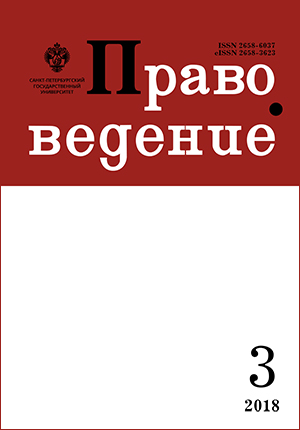Exemptions from punishment in China and Thailand from the perspective of the theory of Leon Petrazycky
DOI:
https://doi.org/10.21638/spbu25.2018.309Abstract
This paper compares legislative provisions of Chinese and Thai laws pertaining to exemptions from punishment. These exemptions must be distinguished from the exemptions from criminal liability. In the latter case, Chinese and Thai courts cannot inflict punishment on a person who is justified or excused in committing an act otherwise defined as a crime. In contrast, an exemption from punishment is granted by courts as an exercise of discretionary powers. Chinese and Thai laws bear similar characteristics in defining the exemptions from criminal liability, but differ significantly in the scope of discretionary powers of courts to exempt from punishments. Chinese law allows judges to have more discretion in not imposing penalties on an offender than Thai law does. The reason for the difference lies in a greater openness of Chinese law to moral considerations to be played in sentencing practices. Thai law is much more influenced by the philosophy of legal positivism. These similarities and differences are discussed in the light of the theory of Leon Petrazycki. It is argued that Petyrazycki’s concept of intuitive law as attributive imperatives is important in explaining and justifying the powers of the court not to inflict punishment if it meets the goals of criminal justice. From the viewpoint of the theory of Petrazycki, Chinese law can accommodate better the intuitive law of the public to the exigencies of various social situations. However, Petrazycki’s theory alone cannot override many reasons against giving judges extensive powers to apply their intuitive laws to exempt offenders from punishment. There is a plurality of psychological imperatives which may conflict with each other. To resolve those conflicts, it is necessary to draw on the idea of natural law. Even though Petrazycki did not explicitly argue for the existence of the natural law, its existence can be drawn from common psychological imperatives as well as from a striking similarity between various systems of criminal law in such diverse countries as China and Thailand. Many of the legal provisions of their laws display certain common legal paradigms that cannot be only accounted for by the adoption of the Western legal concepts.
Downloads
References
References
Ashworth, Andrew, and Jeremy Horder. 2013. Principles of criminal law. Oxford, University Press.
Badar, Mohamed Elewa. 2013. The concept of Mens Rea in international criminal law: The case for a Unified Approach. Oxford, Hart Publishing.
Benn, Charles D. 2004. China’s Golden Age: Everyday Life in the Tang Dynasty. Oxford, University Press.
Blackstone, William. 1769. Commentaries on the Laws of England. Oxford, Clarendon Press.
Chen, Jianfu. 2015. Chinese Law: Context and Transformation. Leiden, Brill.
Duff, Robin Antony. 2007. Answering for crime: Responsibility and liability in the criminal law. Oxford, Hart Publishing.
Farmer, Lindsay. 2016. Making the modern criminal law: Criminalization and civil order. Oxford, University Press.
Gorecki, Jan. 1975. Sociology and jurisprudence of Leon Petrażycki. Urbana, University of Illinois Press.
Hallevy, Gabriel. 2010. A modern treatise on the principle of legality in criminal law. Heidelberg, Springer science & business media. In re Levasseur, 737 F.3d 814 (1st Cir. 2013).
Lijuan, Xing. 2015. The Rhyme of History: A Transition of Legal Culture in China Crowned by the Criminal Procedure Law 2012. Asia Pacific Law Review 23 (1): 31–65.
Petrazycki, Leon. 1910. Teoria Prava i Gosudarstva. St. Petersburg, Merkushev Publ. Petrazycki Leon. 1955. Law and Morality. Cambridge, Mass., Harvard University Press.
Downloads
Published
How to Cite
Issue
Section
License
Articles of "Pravovedenie" are open access distributed under the terms of the License Agreement with Saint Petersburg State University, which permits to the authors unrestricted distribution and self-archiving free of charge.




